#Wolfgang Rohrbach
Text
WERTEWANDEL UND WERTERENAISSANCE IN ZEITEN DER PANDEMIE UND KLIMAKRISE
WERTEWANDEL UND WERTERENAISSANCE IN ZEITEN DER PANDEMIE UND KLIMAKRISE
13. September 2022
Foto Dr. Wladimir Fried
Prof. Silke Vollenhofer lud zur Präsentation des Bandes XVI der Versicherungsgeschichte Österreichs in die Universität für angewandte Kunst ein und konnte prominente Gäste aus der Versicherungswirtschaft, der Wissenschaft und der Politik begrüßen.
Herausgegeben wird die Versicherungsgeschichte Österreichs von Prof. Wolfgang Rohrbach, Präsident von…
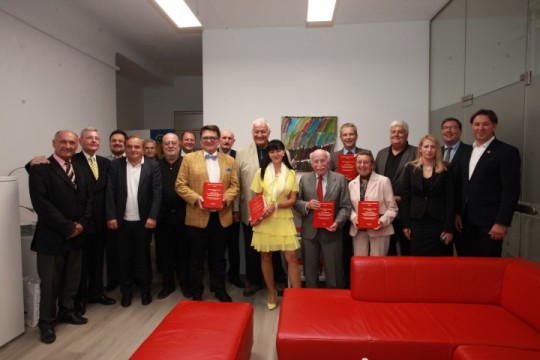
View On WordPress
#ÖSG#Österreichisch-Serbische Gesellschaft#Christian Hanus#Dejan Jelic#Europa Nostra Austria#Hartwig Löger#Silke Vollenhofer#Univ.Prof. Dr. Klaus Zapotoczky#Versicherungsgeschichte#Wolfgang Rohrbach#Zoran Kalabic#Zoran Sijakovic
0 notes
Photo
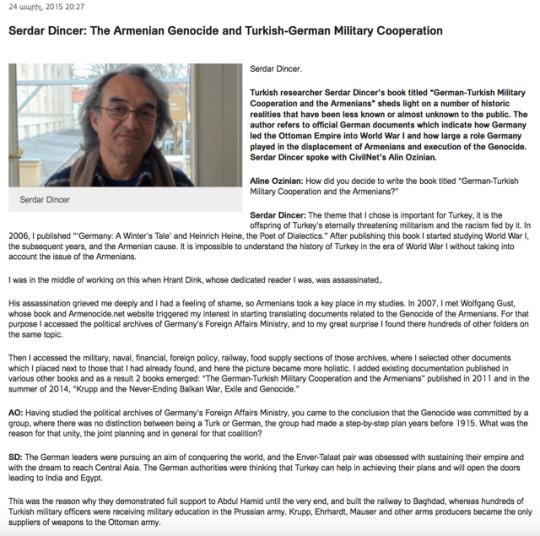
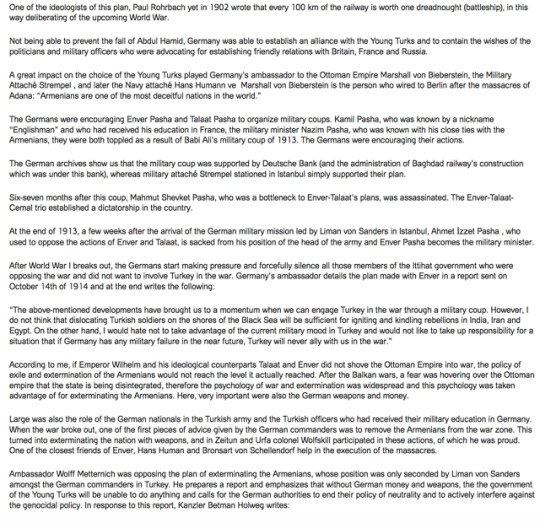
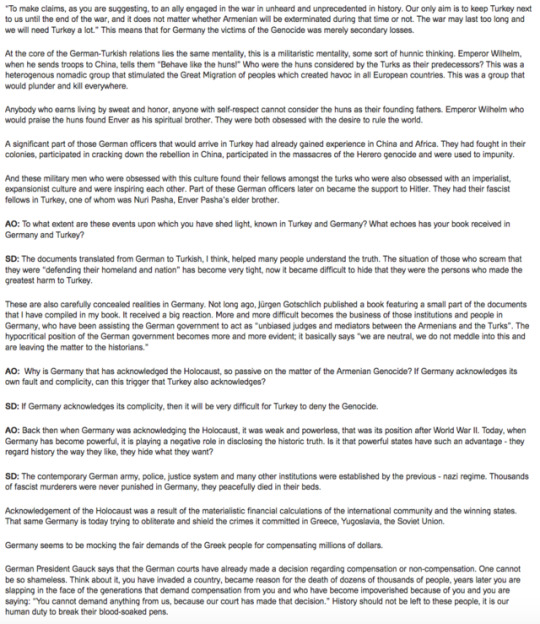
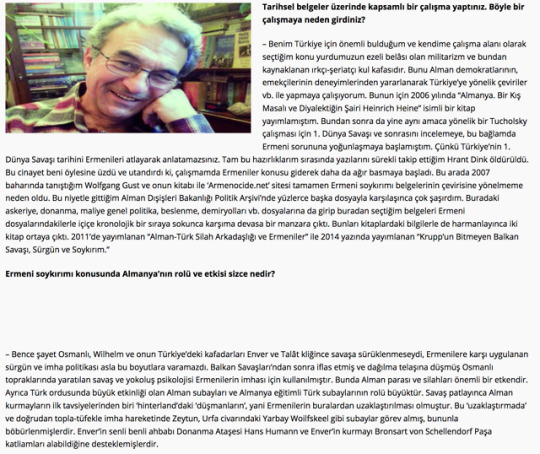
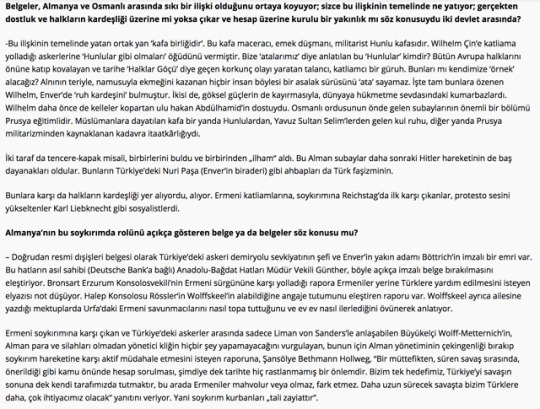
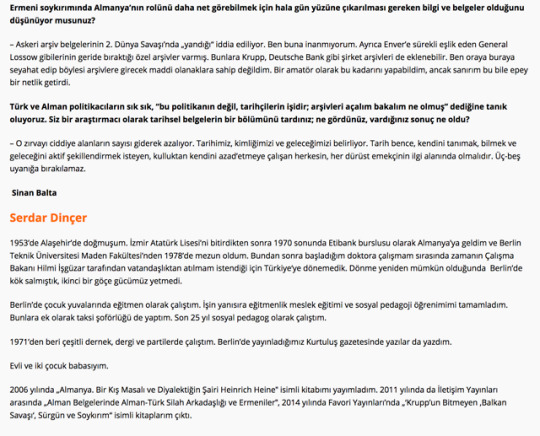
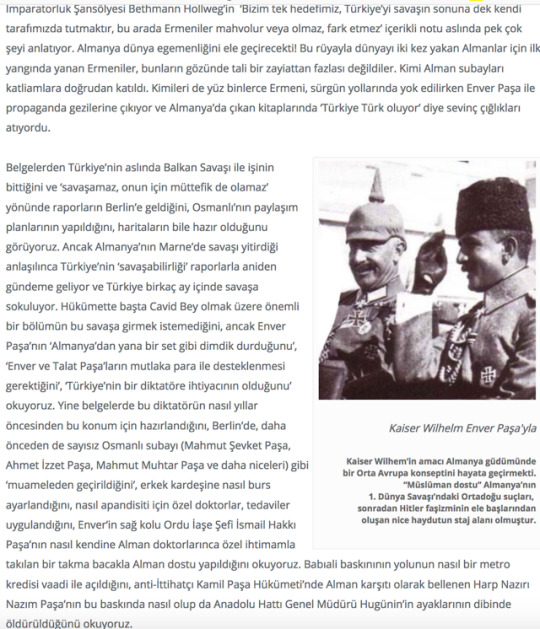
https://www.civilnet.am/news/2015/04/24/serdar-dincer-armenian-genocide-turkish-german-military-cooperation/268551
*
https://yenihayat.de/2015/04/13/yazar-serdar-dincerle-soeylesi-alman-tuerk-silah-arkadasligi-ve-ermeniler/
--
24 ապրիլ, 2015 20:27
Serdar Dincer: The Armenian Genocide and Turkish-German Military Cooperation
Serdar Dincer
Serdar Dincer.
Turkish researcher Serdar Dincer’s book titled “German-Turkish Military Cooperation and the Armenians” sheds light on a number of historic realities that have been less known or almost unknown to the public. The author refers to official German documents which indicate how Germany led the Ottoman Empire into World War I and how large a role Germany played in the displacement of Armenians and execution of the Genocide. Serdar Dincer spoke with CivilNet’s Alin Ozinian.
Aline Ozinian: How did you decide to write the book titled “German-Turkish Military Cooperation and the Armenians?”
Serdar Dincer: The theme that I chose is important for Turkey, it is the offspring of Turkey’s eternally threatening militarism and the racism fed by it. In 2006, I published “‘Germany: A Winter’s Tale’ and Heinrich Heine, the Poet of Dialectics.” After publishing this book I started studying World War I, the subsequent years, and the Armenian cause. It is impossible to understand the history of Turkey in the era of World War I without taking into account the issue of the Armenians.
I was in the middle of working on this when Hrant Dink, whose dedicated reader I was, was assassinated,.
His assassination grieved me deeply and I had a feeling of shame, so Armenians took a key place in my studies. In 2007, I met Wolfgang Gust, whose book and Armenocide.net website triggered my interest in starting translating documents related to the Genocide of the Armenians. For that purpose I accessed the political archives of Germany’s Foreign Affairs Ministry, and to my great surprise I found there hundreds of other folders on the same topic.
Then I accessed the military, naval, financial, foreign policy, railway, food supply sections of those archives, where I selected other documents which I placed next to those that I had already found, and here the picture became more holistic. I added existing documentation published in various other books and as a result 2 books emerged: “The German-Turkish Military Cooperation and the Armenians” published in 2011 and in the summer of 2014, “Krupp and the Never-Ending Balkan War, Exile and Genocide.”
AO: Having studied the political archives of Germany’s Foreign Affairs Ministry, you came to the conclusion that the Genocide was committed by a group, where there was no distinction between being a Turk or German, the group had made a step-by-step plan years before 1915. What was the reason for that unity, the joint planning and in general for that coalition?
SD: The German leaders were pursuing an aim of conquering the world, and the Enver-Talaat pair was obsessed with sustaining their empire and with the dream to reach Central Asia. The German authorities were thinking that Turkey can help in achieving their plans and will open the doors leading to India and Egypt.
This was the reason why they demonstrated full support to Abdul Hamid until the very end, and built the railway to Baghdad, whereas hundreds of Turkish military officers were receiving military education in the Prussian army. Krupp, Ehrhardt, Mauser and other arms producers became the only suppliers of weapons to the Ottoman army.
One of the ideologists of this plan, Paul Rohrbach yet in 1902 wrote that every 100 km of the railway is worth one dreadnought (battleship), in this way deliberating of the upcoming World War.
Not being able to prevent the fall of Abdul Hamid, Germany was able to establish an alliance with the Young Turks and to contain the wishes of the politicians and military officers who were advocating for establishing friendly relations with Britain, France and Russia.
A great impact on the choice of the Young Turks played Germany’s ambassador to the Ottoman Empire Marshall von Bieberstein, the Military Attaché Strempel , and later the Navy attaché Hans Humann ve Marshall von Bieberstein is the person who wired to Berlin after the massacres of Adana: “Armenians are one of the most deceitful nations in the world.”
The Germans were encouraging Enver Pasha and Talaat Pasha to organize military coups. Kamil Pasha, who was known by a nickname “Englishman” and who had received his education in France, the military minister Nazim Pasha, who was known with his close ties with the Armenians, they were both toppled as a result of Babi Ali’s military coup of 1913. The Germans were encouraging their actions.
The German archives show us that the military coup was supported by Deutsche Bank (and the administration of Baghdad railway’s construction which was under this bank), whereas military attaché Strempel stationed in Istanbul simply supported their plan.
Six-seven months after this coup, Mahmut Shevket Pasha, who was a bottleneck to Enver-Talaat’s plans, was assassinated. The Enver-Talaat-Cemal trio established a dictatorship in the country.
At the end of 1913, a few weeks after the arrival of the German military mission led by Liman von Sanders in Istanbul, Ahmet İzzet Pasha , who used to oppose the actions of Enver and Talaat, is sacked from his position of the head of the army and Enver Pasha becomes the military minister.
After World War I breaks out, the Germans start making pressure and forcefully silence all those members of the Ittihat government who were opposing the war and did not want to involve Turkey in the war. Germany’s ambassador details the plan made with Enver in a report sent on October 14th of 1914 and at the end writes the following:
“The above-mentioned developments have brought us to a momentum when we can engage Turkey in the war through a military coup. However, I do not think that dislocating Turkish soldiers on the shores of the Black Sea will be sufficient for igniting and kindling rebellions in India, Iran and Egypt. On the other hand, I would hate not to take advantage of the current military mood in Turkey and would not like to take up responsibility for a situation that if Germany has any military failure in the near future, Turkey will never ally with us in the war.”
According to me, if Emperor Wilhelm and his ideological counterparts Talaat and Enver did not shove the Ottoman Empire into war, the policy of exile and extermination of the Armenians would not reach the level it actually reached. After the Balkan wars, a fear was hovering over the Ottoman empire that the state is being disintegrated, therefore the psychology of war and extermination was widespread and this psychology was taken advantage of for exterminating the Armenians. Here, very important were also the German weapons and money.
Large was also the role of the German nationals in the Turkish army and the Turkish officers who had received their military education in Germany. When the war broke out, one of the first pieces of advice given by the German commanders was to remove the Armenians from the war zone. This turned into exterminating the nation with weapons, and in Zeitun and Urfa colonel Wolfskill participated in these actions, of which he was proud. One of the closest friends of Enver, Hans Human and Bronsart von Schellendorf help in the execution of the massacres.
Ambassador Wolff Metternich was opposing the plan of exterminating the Armenians, whose position was only seconded by Liman von Sanders amongst the German commanders in Turkey. He prepares a report and emphasizes that without German money and weapons, the the government of the Young Turks will be unable to do anything and calls for the German authorities to end their policy of neutrality and to actively interfere against the genocidal policy. In response to this report, Kanzler Betman Holweg writes:
“To make claims, as you are suggesting, to an ally engaged in the war in unheard and unprecedented in history. Our only aim is to keep Turkey next to us until the end of the war, and it does not matter whether Armenian will be exterminated during that time or not. The war may last too long and we will need Turkey a lot.” This means that for Germany the victims of the Genocide was merely secondary losses.
At the core of the German-Turkish relations lies the same mentality, this is a militaristic mentality, some sort of hunnic thinking. Emperor Wilhelm, when he sends troops to China, tells them “Behave like the huns!” Who were the huns considered by the Turks as their predecessors? This was a heterogenous nomadic group that stimulated the Great Migration of peoples which created havoc in all European countries. This was a group that would plunder and kill everywhere.
Anybody who earns living by sweat and honor, anyone with self-respect cannot consider the huns as their founding fathers. Emperor Wilhelm who would praise the huns found Enver as his spiritual brother. They were both obsessed with the desire to rule the world.
A significant part of those German officers that would arrive in Turkey had already gained experience in China and Africa. They had fought in their colonies, participated in cracking down the rebellion in China, participated in the massacres of the Herero genocide and were used to impunity.
And these military men who were obsessed with this culture found their fellows amongst the turks who were also obsessed with an imperialist, expansionist culture and were inspiring each other. Part of these German officers later on became the support to Hitler. They had their fascist fellows in Turkey, one of whom was Nuri Pasha, Enver Pasha’s elder brother.
AO: To what extent are these events upon which you have shed light, known in Turkey and Germany? What echoes has your book received in Germany and Turkey?
SD: The documents translated from German to Turkish, I think, helped many people understand the truth. The situation of those who scream that they were “defending their homeland and nation” has become very tight, now it became difficult to hide that they were the persons who made the greatest harm to Turkey.
These are also carefully concealed realities in Germany. Not long ago, Jürgen Gotschlich published a book featuring a small part of the documents that I have compiled in my book. It received a big reaction. More and more difficult becomes the business of those institutions and people in Germany, who have been assisting the German government to act as “unbiased judges and mediators between the Armenians and the Turks”․ The hypocritical position of the German government becomes more and more evident; it basically says “we are neutral, we do not meddle into this and are leaving the matter to the historians.”
AO: Why is Germany that has acknowledged the Holocaust, so passive on the matter of the Armenian Genocide? If Germany acknowledges its own fault and complicity, can this trigger that Turkey also acknowledges?
SD: If Germany acknowledges its complicity, then it will be very difficult for Turkey to deny the Genocide.
AO: Back then when Germany was acknowledging the Holocaust, it was weak and powerless, that was its position after World War II. Today, when Germany has become powerful, it is playing a negative role in disclosing the historic truth. Is it that powerful states have such an advantage - they regard history the way they like, they hide what they want?
SD: The contemporary German army, police, justice system and many other institutions were established by the previous - nazi regime. Thousands of fascist murderers were never punished in Germany, they peacefully died in their beds.
Acknowledgement of the Holocaust was a result of the materialistic financial calculations of the international community and the winning states. That same Germany is today trying to obliterate and shield the crimes it committed in Greece, Yugoslavia, the Soviet Union.
Germany seems to be mocking the fair demands of the Greek people for compensating millions of dollars.
German President Gauck says that the German courts have already made a decision regarding compensation or non-compensation. One cannot be so shameless. Think about it, you have invaded a country, became reason for the death of dozens of thousands of people, years later you are slapping in the face of the generations that demand compensation from you and who have become impoverished because of you and you are saying: “You cannot demand anything from us, because our court has made that decision.” History should not be left to these people, it is our human duty to break their blood-soaked pens.
**
Tarihsel belgeler üzerinde kapsamlı bir çalışma yaptınız. Böyle bir çalışmaya neden girdiniz?
– Benim Türkiye için önemli bulduğum ve kendime çalışma alanı olarak seçtiğim konu yurdumuzun ezeli belâsı olan militarizm ve bundan kaynaklanan ırkçı-şeriatçı kul kafasıdır. Bunu Alman demokratlarının, emekçilerinin deneyimlerinden yararlanarak Türkiye’ye yönelik çeviriler vb. ile yapmaya çalışıyorum. Bunun için 2006 yılında “Almanya. Bir Kış Masalı ve Diyalektiğin Şairi Heinrich Heine” isimli bir kitap yayımlamıştım. Bundan sonra da yine aynı amaca yönelik bir Tucholsky çalışması için 1. Dünya Savaşı ve sonrasını incelemeye, bu bağlamda Ermeni sorununa yoğunlaşmaya başlamıştım. Çünkü Türkiye’nin 1. Dünya Savaşı tarihini Ermenileri atlayarak anlatamazsınız. Tam bu hazırlıklarım sırasında yazılarını sürekli takip ettiğim Hrant Dink öldürüldü. Bu cinayet beni öylesine üzdü ve utandırdı ki, çalışmamda Ermeniler konusu giderek daha da ağır basmaya başladı. Bu arada 2007 baharında tanıştığım Wolfgang Gust ve onun kitabı ile ‘Armenocide.net’ sitesi tamamen Ermeni soykırımı belgelerinin çevirisine yönelmeme neden oldu. Bu niyetle gittiğim Alman Dışişleri Bakanlığı Politik Arşivi’nde yüzlerce başka dosyayla karşılaşınca çok şaşırdım. Buradaki askeriye, donanma, maliye genel politika, beslenme, demiryolları vb. dosyalarına da girip buradan seçtiğim belgeleri Ermeni dosyalarındakilerle içiçe kronolojik bir sıraya sokunca karşıma devasa bir manzara çıktı. Bunları kitaplardaki bilgilerle de harmanlayınca iki kitap ortaya çıktı. 2011’de yayımlanan “Alman-Türk Silah Arkadaşlığı ve Ermeniler” ile 2014 yazında yayımlanan “Krupp’un Bitmeyen Balkan Savaşı, Sürgün ve Soykırım.”
Ermeni soykırımı konusunda Almanya’nın rolü ve etkisi sizce nedir?
– Bence şayet Osmanlı, Wilhelm ve onun Türkiye’deki kafadarları Enver ve Talât kliğince savaşa sürüklenmeseydi, Ermenilere karşı uygulanan sürgün ve imha politikası asla bu boyutlara varamazdı. Balkan Savaşları’ndan sonra iflas etmiş ve dağılma telaşına düşmüş Osmanlı topraklarında yaratılan savaş ve yokoluş psikolojisi Ermenilerin imhası için kullanılmıştır. Bunda Alman parası ve silahları önemli bir etkendir. Ayrıca Türk ordusunda büyük etkinliği olan Alman subayları ve Almanya eğitimli Türk subaylarının rolü büyüktür. Savaş patlayınca Alman kurmayların ilk tavsiyelerinden biri ‘hinterland’daki ‘düşmanların’, yani Ermenilerin buralardan uzaklaştırılması olmuştur. Bu ‘uzaklaştırmada’ ve doğrudan topla-tüfekle imha hareketinde Zeytun, Urfa civarındaki Yarbay Woilfskeel gibi subaylar görev almış, bununla böbürlenmişlerdir. Enver’in senli benli ahbabı Donanma Ataşesi Hans Humann ve Enver’in kurmayı Bronsart von Schellendorf Paşa katliamları alabildiğine desteklemişlerdir.
Belgeler, Almanya ve Osmanlı arasında sıkı bir ilişki olduğunu ortaya koyuyor; sizce bu ilişkinin temelinde ne yatıyor; gerçekten dostluk ve halkların kardeşliği üzerine mi yoksa çıkar ve hesap üzerine kurulu bir yakınlık mı söz konusuydu iki devlet arasında?
-Bu ilişkinin temelinde yatan ortak yan ‘kafa birliğidir’. Bu kafa maceracı, emek düşmanı, militarist Hunlu kafasıdır. Wilhelm Çin’e katliama yolladığı askerlerine ‘Hunlular gibi olmaları’ öğüdünü vermiştir. Bize ‘atalarımız’ diye anlatılan bu ‘Hunlular’ kimdir? Bütün Avrupa halklarını önüne katıp kovalayan ve tarihe ‘Halklar Göçü’ diye geçen korkunç olayı yaratan talancı, katliamcı bir güruh. Bunları mı kendimize ‘örnek’ alacağız? Alnının teriyle, namusuyla ekmeğini kazanan hiçbir insan böylesi bir asalak sürüsünü ‘ata’ sayamaz. İşte tam bunlara özenen Wilhelm, Enver’de ‘ruh kardeşini’ bulmuştur. İkisi de, göksel güçlerin de kayırmasıyla, dünyaya hükmetme sevdasındaki kumarbazlardı. Wilhelm daha önce de kelleler kopartan ulu hakan Abdülhamid’in dostuydu. Osmanlı ordusunun önde gelen subaylarının önemli bir bölümü Prusya eğitimlidir. Müslümanlara dayatılan kafa bir yanda Hunlulardan, Yavuz Sultan Selim’lerden gelen kul ruhu, diğer yanda Prusya militarizminden kaynaklanan kadavra itaatkârlığıydı.
İki taraf da tencere-kapak misali, birbirlerini buldu ve birbirinden „ilham“ aldı. Bu Alman subaylar daha sonraki Hitler hareketinin de baş dayanakları oldular. Bunların Türkiye’deki Nuri Paşa (Enver’in biraderi) gibi ahbapları da Türk faşizminin.
Bunlara karşı da halkların kardeşliği yer alıyordu, alıyor. Ermeni katliamlarına, soykırımına Reichstag’da ilk karşı çıkanlar, protesto sesini yükseltenler Karl Liebknecht gibi sosyalistlerdi.
Almanya’nın bu soykırımda rolünü açıkça gösteren belge ya da belgeler söz konusu mu?
– Doğrudan resmi dışişleri belgesi olarak Türkiye’deki askeri demiryolu sevkiyatının şefi ve Enver’in yakın adamı Böttrich’in imzalı bir emri var. Bu hatların asıl sahibi (Deutsche Bank’a bağlı) Anadolu-Bağdat Hatları Müdür Vekili Günther, böyle açıkça imzalı belge bırakılmasını eleştiriyor. Bronsart Erzurum Konsolosvekili’nin Ermeni sürgününe karşı yolladığı rapora Ermeniler yerine Türklere yardım edilmesini isteyen elyazısı not düşüyor. Halep Konsolosu Rössler‘in Wolffskeel’in alabildiğine angaje tutumunu eleştiren raporu var. Wolffskeel ayrıca ailesine yazdığı mektuplarda Urfa’daki Ermeni savunmacılarını nasıl topa tuttuğunu ve ev ev nasıl ilerlediğini övünerek anlatıyor.
Ermeni soykırımına karşı çıkan ve Türkiye’deki askerler arasında sadece Liman von Sanders’le anlaşabilen Büyükelçi Wolff-Metternich’in, Alman para ve silahları olmadan yönetici kliğin hiçbir şey yapamayacağını vurgulayan, bunun için Alman yönetiminin çekingenliği bırakıp soykırım hareketine karşı aktif müdahale etmesini isteyen raporuna, Şansölye Bethmann Hollweg, “Bir müttefikten, süren savaş sırasında, önerildiği gibi kamu önünde hesap sorulması, şimdiye dek tarihte hiç rastlanmamış bir önlemdir. Bizim tek hedefimiz, Türkiye’yi savaşın sonuna dek kendi tarafımızda tutmaktır, bu arada Ermeniler mahvolur veya olmaz, fark etmez. Daha uzun sürecek savaşta bizim Türklere daha, çok ihtiyacımız olacak“ yanıtını veriyor. Yani soykırım kurbanları „tali zayiattır“.
Ermeni soykırımında Almanya’nın rolünü daha net görebilmek için hala gün yüzüne çıkarılması gereken bilgi ve belgeler olduğunu düşünüyor musunuz?
– Askeri arşiv belgelerinin 2. Dünya Savaşı’nda „yandığı“ iddia ediliyor. Ben buna inanmıyorum. Ayrıca Enver’e sürekli eşlik eden General Lossow gibilerinin geride bıraktığı özel arşivler varmış. Bunlara Krupp, Deutsche Bank gibi şirket arşivleri de eklenebilir. Ben oraya buraya seyahat edip böylesi arşivlere girecek maddi olanaklara sahip değildim. Bir amatör olarak bu kadarını yapabildim, ancak sanırım bu bile epey bir netlik getirdi.
Türk ve Alman politikacıların sık sık, “bu politikanın değil, tarihçilerin işidir; arşivleri açalım bakalım ne olmuş” dediğine tanık oluyoruz. Siz bir araştırmacı olarak tarihsel belgelerin bir bölümünü tardınız; ne gördünüz, vardığınız sonuç ne oldu?
– O zırvayı ciddiye alanların sayısı giderek azalıyor. Tarihimiz, kimliğimizi ve geleceğimizi belirliyor. Tarih bence, kendini tanımak, bilmek ve geleceğini aktif şekillendirmek isteyen, kulluktan kendini azad’etmeye çalışan herkesin, her dürüst emekçinin ilgi alanında olmalıdır. Üç-beş uyanığa bırakılamaz.
Sinan Balta
Serdar Dinçer
1953’de Alaşehir’de doğmuşum. İzmir Atatürk Lisesi’ni bitirdikten sonra 1970 sonunda Etibank burslusu olarak Almanya’ya geldim ve Berlin Teknik Üniversitesi Maden Fakültesi’nden 1978’de mezun oldum. Bundan sonra başladığım doktora çalışmam sırasında zamanın Çalışma Bakanı Hilmi İşgüzar tarafından vatandaşlıktan atılmam istendiği için Türkiye‘ye dönemedik. Dönme yeniden mümkün olduğunda Berlin’de kök salmıştık, ikinci bir göçe gücümüz yetmedi.
Berlin’de çocuk yuvalarında eğitmen olarak çalıştım. İşin yanısıra eğitmenlik meslek eğitimi ve sosyal pedagoji öğrenimimi tamamladım. Bunlara ek olarak taksi şoförlüğü de yaptım. Son 25 yıl sosyal pedagog olarak çalıştım.
1971’den beri çeşitli dernek, dergi ve partilerde çalıştım. Berlin’de yayınladığımız Kurtuluş gazetesinde yazılar da yazdım.
Evli ve iki çocuk babasıyım.
2006 yılında „Almanya. Bir Kış Masalı ve Diyalektiğin Şairi Heinrich Heine‟ isimli kitabımı yayımladım. 2011 yılında da İletişim Yayınları arasında „Alman Belgelerinde Alman-Türk Silah Arkadaşlığı ve Ermeniler‟, 2014 yılında Favori Yayınları’nda „‘Krupp’un Bitmeyen ‚Balkan Savaşı‘, Sürgün ve Soykırım“ isimli kitaplarım çıktı.
http://www.agos.com.tr/tr/yazi/2976/1915-hitler-fasizminin-staj-alaniydi
İmparatorluk Şansölyesi Bethmann Hollweg’in ‘Bizim tek hedefimiz, Türkiye’yi savaşın sonuna dek kendi tarafımızda tutmaktır, bu arada Ermeniler mahvolur veya olmaz, fark etmez’ içerikli notu aslında pek çok şeyi anlatıyor. Almanya dünya egemenliğini ele geçirecekti! Bu rüyayla dünyayı iki kez yakan Almanlar için ilk yangında yanan Ermeniler, bunların gözünde tali bir zayiattan fazlası değildiler. Kimi Alman subayları katliamlara doğrudan katıldı. Kimileri de yüz binlerce Ermeni, sürgün yollarında yok edilirken Enver Paşa ile propaganda gezilerine çıkıyor ve Almanya’da çıkan kitaplarında ‘Türkiye Türk oluyor’ diye sevinç çığlıkları atıyordu.
Kaiser Wilhelm Enver Paşa'yla
Kaiser Wilhem’in amacı Almanya güdümünde
bir Orta Avrupa konseptini hayata geçirmekti. “Müslüman dostu” Almanya’nın
1. Dünya Savaşı’ndaki Ortadoğu suçları,
sonradan Hitler faşizminin ele başlarından
oluşan nice haydutun staj alanı olmuştur.
Belgelerden Türkiye’nin aslında Balkan Savaşı ile işinin bittiğini ve ‘savaşamaz, onun için müttefik de olamaz’ yönünde raporların Berlin’e geldiğini, Osmanlı’nın paylaşım planlarının yapıldığını, haritaların bile hazır olduğunu görüyoruz. Ancak Almanya’nın Marne’de savaşı yitirdiği anlaşılınca Türkiye’nin ‘savaşabilirliği’ raporlarla aniden gündeme geliyor ve Türkiye birkaç ay içinde savaşa sokuluyor. Hükümette başta Cavid Bey olmak üzere önemli bir bölümün bu savaşa girmek istemediğini, ancak Enver Paşa’nın ‘Almanya’dan yana bir set gibi dimdik durduğunu’, ‘Enver ve Talat Paşa’ların mutlaka para ile desteklenmesi gerektiğini’, ‘Türkiye’nin bir diktatöre ihtiyacının olduğunu’ okuyoruz. Yine belgelerde bu diktatörün nasıl yıllar öncesinden bu konum için hazırlandığını, Berlin’de, daha önceden de sayısız Osmanlı subayı (Mahmut Şevket Paşa, Ahmet İzzet Paşa, Mahmut Muhtar Paşa ve daha niceleri) gibi ‘muameleden geçirildiğini’, erkek kardeşine nasıl burs ayarlandığını, nasıl apandisiti için özel doktorlar, tedaviler uygulandığını, Enver’in sağ kolu Ordu İaşe Şefi İsmail Hakkı Paşa’nın nasıl kendine Alman doktorlarınca özel ihtimamla takılan bir takma bacakla Alman dostu yapıldığını okuyoruz. Babıali baskınının yolunun nasıl bir metro kredisi vaadi ile açıldığını, anti-İttihatçı Kamil Paşa Hükümeti’nde Alman karşıtı olarak bellenen Harp Nazırı Nazım Paşa’nın bu baskında nasıl olup da Anadolu Hattı Genel Müdürü Hugünin’in ayaklarının dibinde öldürüldüğünü okuyoruz.
1 note
·
View note
Text

LA BIBLE ... QU'EST-ELLE POUR VOUS?
"Car la Parole de Dieu est vivante et efficace. Elle est plus tranchante que toute épée à double tranchant et, pénétrant jusqu’à la division de l’âme ainsi que de l’esprit, et des jointures ainsi que de la moelle, elle juge les dispositions et les pensées du cœur."
Hébreux 4:12
Vous avez accepté, non la parole des hommes, mais (ainsi qu'elle l'est véritablement) la parole de Dieu. 1 Thessaloniciens 2.13
Au delà de la création qui témoigne d'une façon extraordinaire de sa puissance et de sa sagesse, la Bible est la révélation de Dieu à l'homme. Elle est une "lettre" du Créateur à sa créature.
La Bible, pour certains hommes célèbres :
"Quand l'Ecriture (la Bible) parle, Dieu parle." Saint Augustin
"L'Évangile possède une vertu secrète, je ne sais quoi d'efficace et de chaleureux qui agit sur l'entendement et qui charme le coeur, l'Évangile n'est pas un livre : c'est un être vivant." Napoléon 1er
"La Bible est vivante, elle me parle, elle a des pieds, elle me poursuit. Elle a des mains, et elle me saisit." Martin Luther King
"Derrière toute parole se tient celui qui la prononce. C'est à cause de ce que Dieu est que nous croyons à ce qu'il a dit." John Stott
"La Bible nous donne la connaissance ultime de ce que même le savant ne peut connaître. En Jésus est vraiment caché toute la plénitude de la sagesse et de la connaissance." Professeur Hans Rohrbach
"La Bible est l'un des livres les plus étonnants du monde : chaque fois qu'on l'ouvre, tel passage familier qu'on a lu des vingtaines de fois resplendit soudain d'un éclat nouveau." T. Woodrow Wilson, ancien président des Etats-Unis
"La beauté de la Bible grandit à mesure que nous grandissons dans sa compréhension." J. Wolfgang von Goethe, écrivain allemand
J'ai, moi aussi, la ferme conviction que la Bible est réellement la Parole de Dieu. Elle apporte, dans un monde de plus en plus troublé, des certitudes, la vraie lumière, une espérance vivante à tous ceux qui la reçoivent comme la Parole de Dieu.
Dieu vous bénisse à travers sa parole, amen.
0 notes
Photo

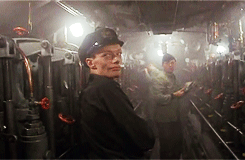

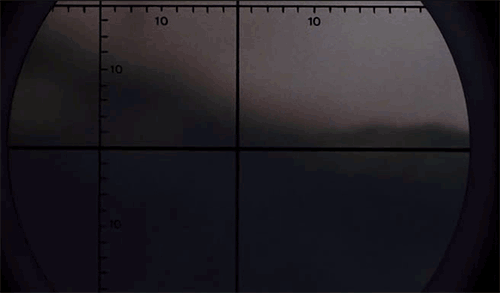
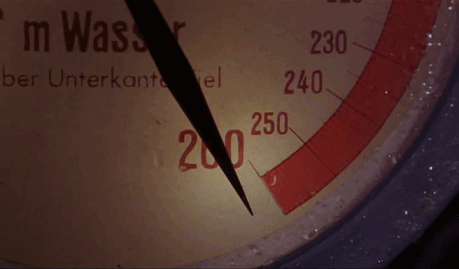
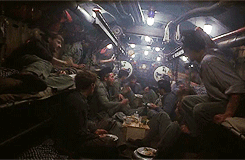

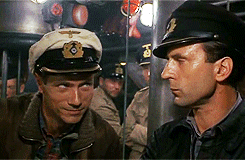
Das Boot is a 1981 German war film written and directed by Wolfgang Petersen, produced by Günter Rohrbach, and starring Jürgen Prochnow, Herbert Grönemeyer, and Klaus Wennemann.
#1980s#das boot#germany#wolfgang petersen#klaus wennemann#herbert gronemeyer#herbert grönemeyer#ww2#jürgen prochnow#second world war#jurgen prochnow#world war two
308 notes
·
View notes
Photo

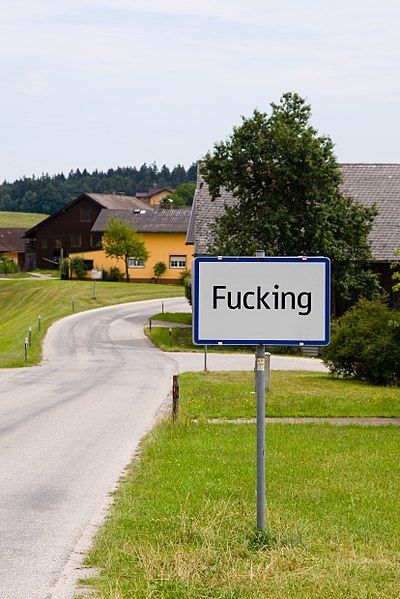
Gerhard Liebmann (* 20. April 1970 in Graz) ist ein österreichischer Schauspieler.
Gerhard Liebmann studierte von 1989 bis 1994 Germanistik und Philosophie an der Karl-Franzens-Universität Graz. Seine Ausbildung zum Schauspieler absolvierte er an der privaten Schauspielschule Barbara McEly in Wien. Es folgten Studienaufenthalte in Berlin, Graz und Griechenland. Von 1994 bis 1996 war er Ensemblemitglied des Landestheaters Linz und von 1997 bis 2000 Ensemblemitglied des Kinder- und Jugendtheaters Next Liberty in Graz. Danach wechselte Liebmann ans Schauspielhaus Graz, wo er von 2000 bis 2012 in zahlreichen Gastrollen zu sehen war. Parallel dazu wurde die Arbeit vor der Kamera wichtiger und Liebmann begann zunehmend in Film- und Fernsehproduktionen mitzuwirken. Sein Debüt gab er 1998 in der Verfilmung von Josef Haslingers Roman Opernball. Einem breiteren Publikum bekannt geworden ist er 2010 durch die Darstellung des Autohändlers Gerry Dirschl in der Komödie Die unabsichtliche Entführung der Frau Elfriede Ott.
Der Autor und Regisseur Kurt Palm schrieb 2010 eine Krimi-Groteske über das Leben in der oberösterreichischen Provinz, die als Anspielung auf den Ortsnamen den Titel Bad Fucking trägt. 2011 inszenierte er ein Stück nach seinem Buch im Theater Phönix in Linz. 2013 wurde der Roman von Harald Sicheritz verfilmt.
Besetzung
Martina Ebm: Veronika Sandleitner
Proschat Madani: Jagoda
Thomas Mraz: Philipp Hintersteiner
Wolfgang Böck: Bgm. Aloysius Hintersteiner
Michael Ostrowski: Kilian Hintersteiner
Bettina Redlich: Karin Hintersteiner
Johannes Silberschneider: Wellisch (Polizeikommandant)
Adele Neuhauser: Maria Sperr (Innenministerin) / Sarena
Gerhard Liebmann: Jakob Ulrich (Zahnarzt)
Maddalena Hirschal: Jasmin Ulrich
2018 wurde die Gemeinde Fucking im Rahmen einer PR-Aktion der Seite Pornhub zu einem sogenannten "Premium Place". Im Rahmen dieses Programms erhalten alle Bewohner des Ortes einen Gratiszugang zu dem kostenpflichtigen Abo-Angebots des Anbieters.
Filme
2018: Murer – Anatomie eines Prozesses
2018: Erik & Erika
2013: Das finstere Tal
2013: Bad Fucking
2012: Blutgletscher
2010: Atmen
2009: Die unabsichtliche Entführung der Frau Elfriede Ott
2009: Jud Süß – Film ohne Gewissen
2008: Lourdes
1999: Heller als der Mond
2018: Neben der Spur – Sag, es tut dir leid
2017: Stadtkomödie – Herrgott für Anfänger
2016: Das Sacher
2015: Maximilian – Das Spiel von Macht und Liebe
2015: Pregau – Kein Weg zurück (in Deutschland: Mörderisches Tal – Pregau)
2015: Bergfried
2014, 2018: Landkrimi
2013–2017 Tatort (Fernsehreihe)
2013: Paul Kemp – Alles kein Problem (Fernsehserie, acht Folgen)
2013: Die Spätzünder 2 – Der Himmel soll warten
2012: Vatertag (Fernsehfilm)
2011: Der Winzerkrieg
2011: Der Wettbewerb
2011: Das Wunder von Kärnten
2010: Vermisst – Alexandra Walch, 17
2010–2018: Spuren des Bösen (Fernsehreihe)
2018: Steirerkind
2014: Wenn du wüsstest, wie schön es hier ist
2017: Tatort: Der Tod ist unser ganzes Leben
2015: Tatort: Die letzte Wiesn
2014: Tatort: Am Ende des Flurs
2013: Tatort: Unvergessen
2018: Wut
2017: Begierde
2015: Liebe
2014: Schande
2012: Racheengel
2010: Das Verhör
2010: Die Mutprobe
2001–2003: Julia – Eine ungewöhnliche Frau (Fernsehserie)
1998: Opernball
2017: Deutscher Schauspielerpreis: Nominierung in der Kategorie Schauspieler in einer komödiantischen Rolle für Wenn du wüsstest, wie schön es hier ist
2016: Romy: Nominierung in der Kategorie Beliebtester Schauspieler Serie/Reihe für Wenn du wüsstest, wie schön es hier ist
2014: Österreichischer Filmpreis: Bester männlicher Darsteller für Blutgletscher
2014: Diagonale Filmfestival: Diagonale-Schauspielpreis als Bester männlicher Darsteller für Blutgletscher, Das finstere Tal und Bad Fucking
2012: Günter Rohrbach Filmpreis: Sonderpreis des Oberbürgermeisters für Das Wunder von Kärnten gemeinsam mit Gerti Drassl
0 notes